「その島のこと」
「 Island 」
いつ頃からかわからないのだけれど、その島には人が住んでいた。
We don't know how long ago, but there were people living on that island.
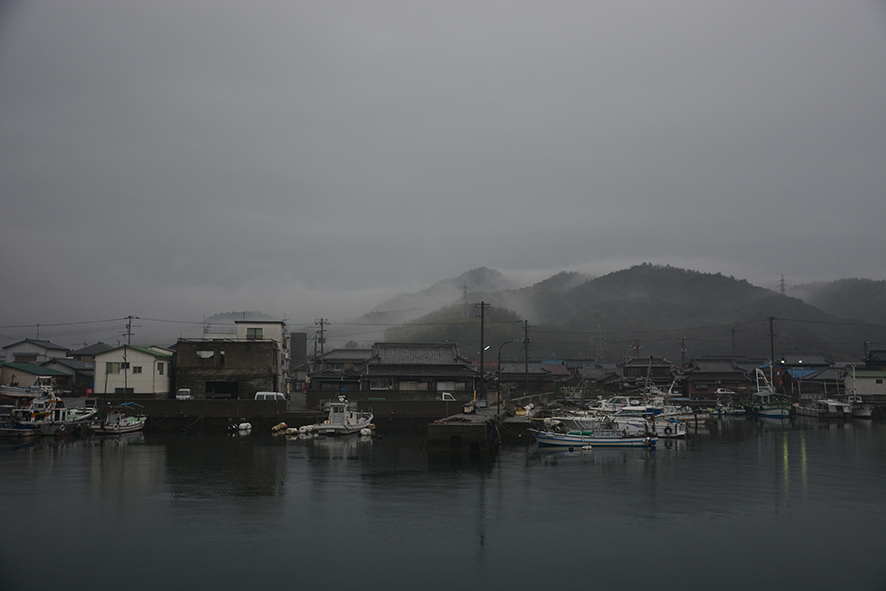
彼らは西の方の浜にいて、良い漁場を移動して数日同じところに船を停め、魚を獲り陸のものと魚と米や野菜を交換して、また次の漁場へと移動する。
そんなことを繰り返しながら、この島にたどり着いた。
They live on the western beaches, move from one good fishing area to another, anchor in the same place for several days,
catch fish, exchange the fish for rice and vegetables with people on land, and then move on to the next fishing area.
After doing this over and over again, they arrived at this island.
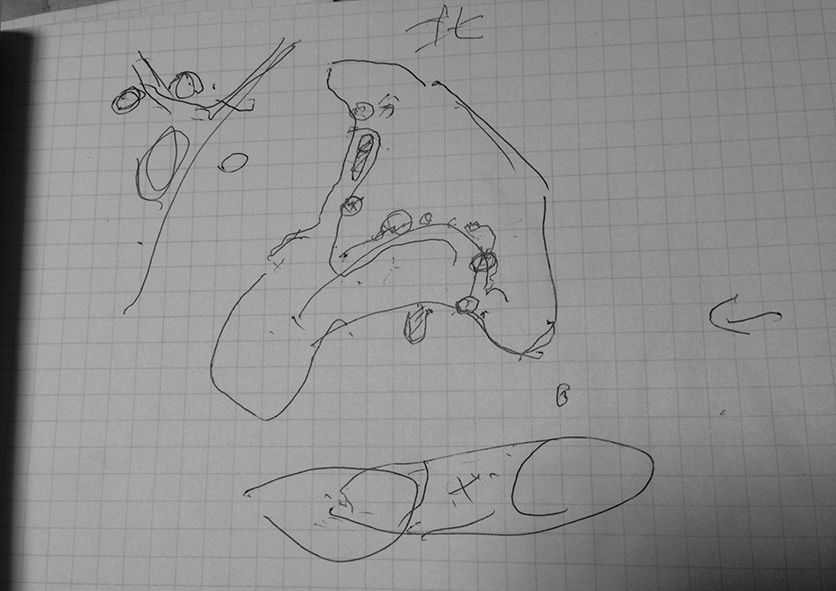
島で彼らは田畑で米や野菜を育て、牛や豚や鶏を飼い、羊を飼って毛を採り、自分たちが植えた果樹で季節の果物を皆で分け合い、自分たちが暮らしていくために必要な物は食べ物でも道具でも殆ど自分たちで作った。対岸の街の農協が薦めるみかんの栽培をして島のそとに出荷して金を稼いだ。
港の前に一軒だけある商店では、文房具やお菓子を買うか電話を繋いでもらい、船に乗るときには立ち寄っていろんなことを話していった。
近くの島に住んでいる人も時々この島にきて、親戚の墓参りや、子守り、薪を拾って帰って行った。
On the island they grew rice and vegetables in fields. They raised cows, pigs, and chickens, as well as sheep for their wool,
and shared seasonal fruits from the fruit trees they planted. They made most of the things they needed to survive, including food and tools.
They earned money by cultivating mandarin oranges recommended by the agricultural cooperative in the town on the opposite coast and shipping them to the other side of the island.
There was only one daily necessities store in front of the port, and islanders and others not only bought stationery and sweets, but also rented phones. When they boarded the ship, they stopped by and talked with the shopkeeper about various things.
People who live on nearby islands often come to this island to visit their relatives' graves, babysit, collect firewood, and return home.

その島には、大きな岩に彫りかけの涅槃像が残されている。人々は彫りかけの涅槃像のことを「寝像」と呼んでいた。
ある時、対岸の街から一人この島に居着いた人がいた。その男の人は「寝像」の頭部を彫り始めた。この辺の島々では、人が渡ってきて居着くことはそんなに珍しいことではなかったから、島の人々はその男の人のことを、親しみを込めて名前で呼んでいた。
On that island, there is a statue of Nirvana carved into a large rock. People called it the 「NEZOU(Sleeping Statue)」
One day, a man from a town on the opposite shore settled on this island. The man began carving the head of the 「NEZOU」 It was not that unusual for people who had crossed over to settle on the islands around here. The people of the island affectionately called the man by his name.
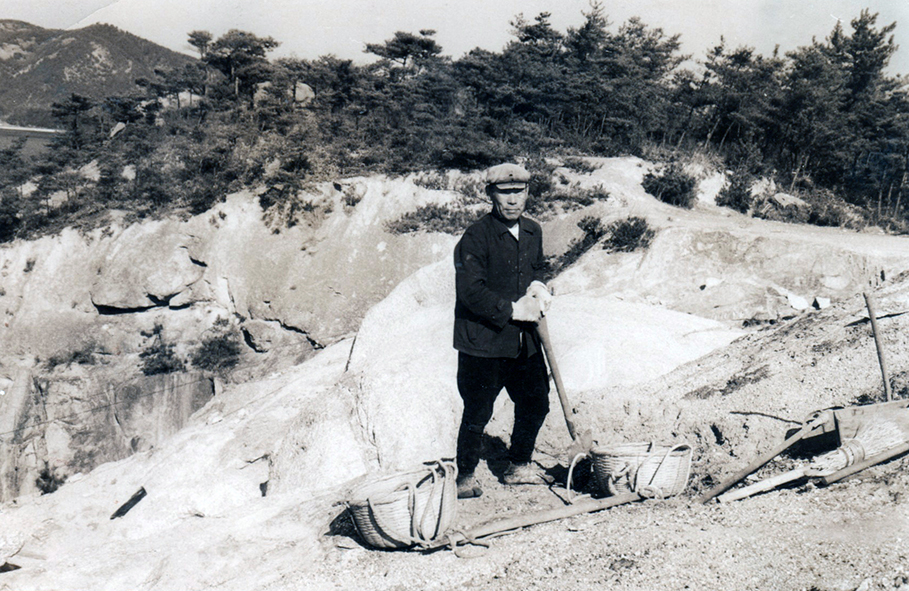
寝像の奥には透き通った深い緑色の水をたたえた泉がある。その泉の水はいつも温かいので、子供たちはその泉のことを「温泉」と呼んで
海で潮遊びをした後そこで体を温めた。
子供たちは小さな船で対岸の街の学校へ通っていた。高校生になると街に下宿して、大きな休みの時だけ島に帰るようになった。
Behind the「NEZOU」is a spring filled with clear, deep green water. The water in the spring was always warm,
so the children called 「ONSEN」and warmed up there after playing in the sea.
Children went to school in a town on the opposite shore by small boat. When they reached high school,
they lived in a boarding house in the city and only returned to the island for big holidays.
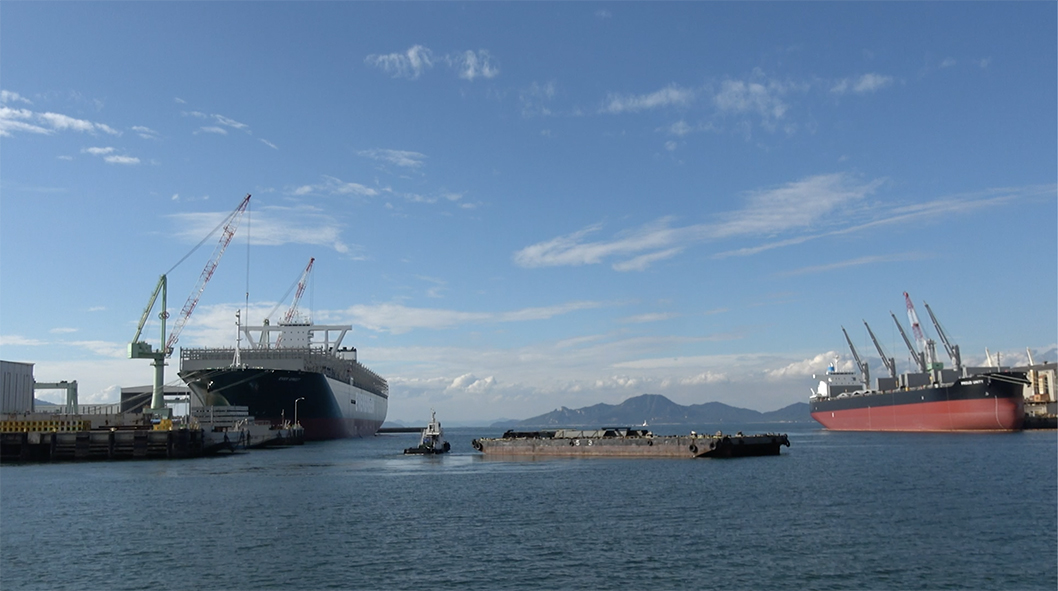
やがて向かいの島に大きな精錬所ができて、周囲の島の人々を優先して良い給料で雇う話が上り、多くの島の若い人たちはその精錬所で働くことを選んだ。
漁師たちの中にもその精練所で作った銅を大阪まで運ぶ船に仕事を変える人も居た。
そんな頃に海では大きな橋を作るための砂を沢山取り始め、今まで取れていた魚がとれなくなり、それで船を降りる漁師が増えた。
Eventually, a large smelter was built on the opposite island, and many young people from the island chose to work at the smelter because they were told that they would be given priority over people from surrounding islands and would be given good wages.
Some fishermen changed their jobs to ships that transported the copper produced at the smelter to Osaka.
Around that time, they began collecting a lot of sand from the sea to build a large bridge. Around the same time, fewer fishermen because they could no longer catch the fish they used to catch.
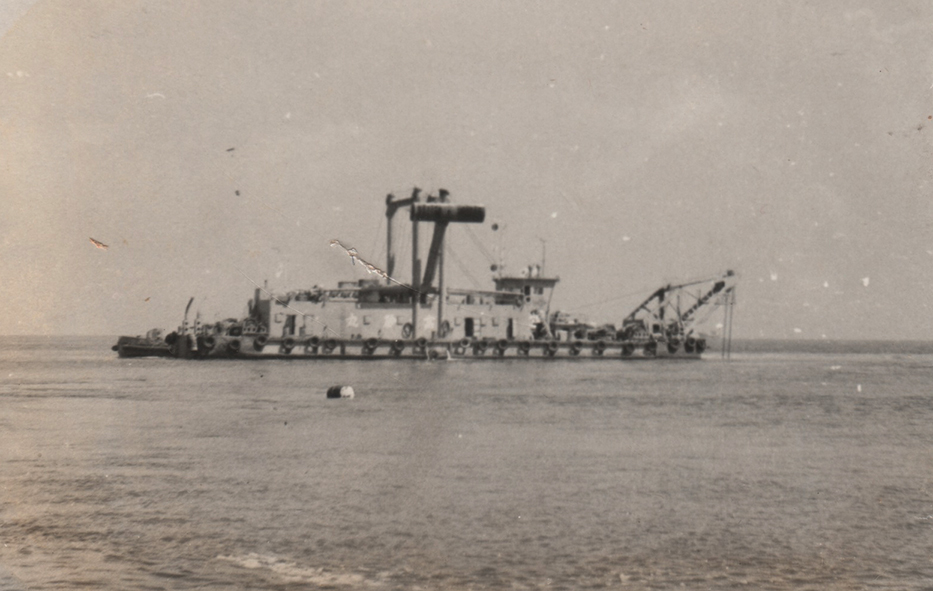
やがて、島にいる若いものがいなくなってしまったので、定期船に乗るものが少なくなって定期船は廃止になった。
残された年寄りたちは残った漁師が出してくれる船で時々街に買い出しに行くようになった。
一度島から出た子供たちは学校を出てもそのまま街で働き始め、やがて街で家庭を持つ。
歳をとった親たちはそれでも自分たちの力で自分たちが居心地がよい暮らしを島で保っていたのだが、街の港のすぐそばにあった病院が街の中心に移動してしまい、
島からは通えなくなった。島の年寄りたちは対岸の街の子供たちのもとへ行くか、施設に入るしか無く、ほとんどの人が島から離れていった。
Eventually, the young people on the island disappeared. As the number of passengers on liner ships decreased, liner ships were discontinued.
Once the children left the island, they started working in the city even after leaving school. Eventually, even after they grow up, they get married and start a family in the city.
The remaining elderly people still managed to maintain a comfortable life on the island with their own efforts. However, the hospital that was located right next to the city's port has been moved to the center of town, making it no longer accessible from the island.
Most of the elderly people on the island have left the island. Because I had no choice but to go to my children in the town on the other side or enter a nursing home.
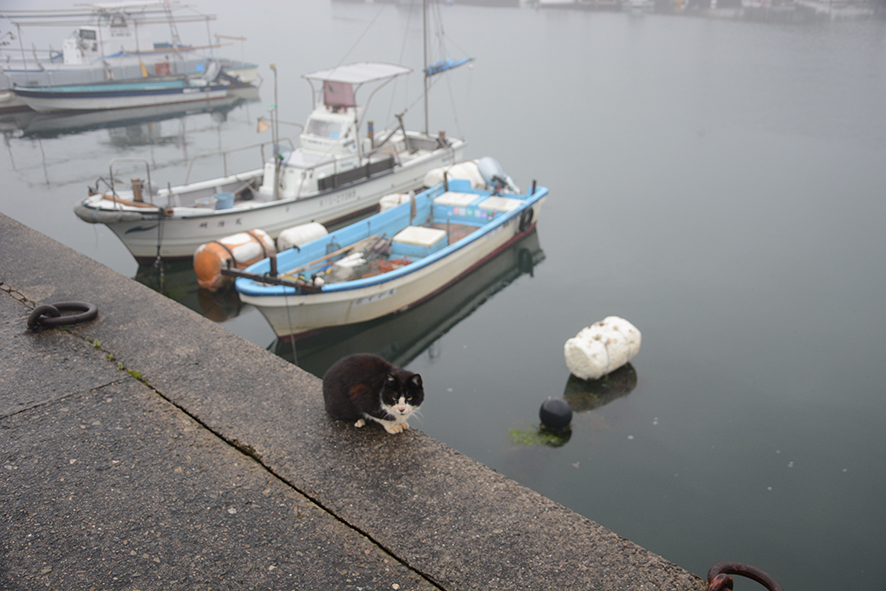
それでも一人の年老いた漁師は元気だったから、工夫をして漁を続け、猫と一緒に暮らしていた。だけれども一人しかいなくなった島に電気を通すことができなくなり対岸の島にいる娘のところへ猫と一緒に行くことを決めた。
However, an old fisherman remained healthy, so he continued fishing and lived with his cat.
However, with only one person left on the island, it became impossible to conduct electricity. For that reason, he also decided to go with the cat to his daughter on the opposite island.

人がいなくなった田畑は草木が覆い、人々が植えた果樹の実は鳥や獣たちが啄みその種をまた周囲に運び、島には様々な樹が生えた。
The fields of the island, where there were no people left, were covered with plants, and birds and animals picked up the fruits of the fruit trees planted by the people, and the seeds were carried around and various trees began to grow.
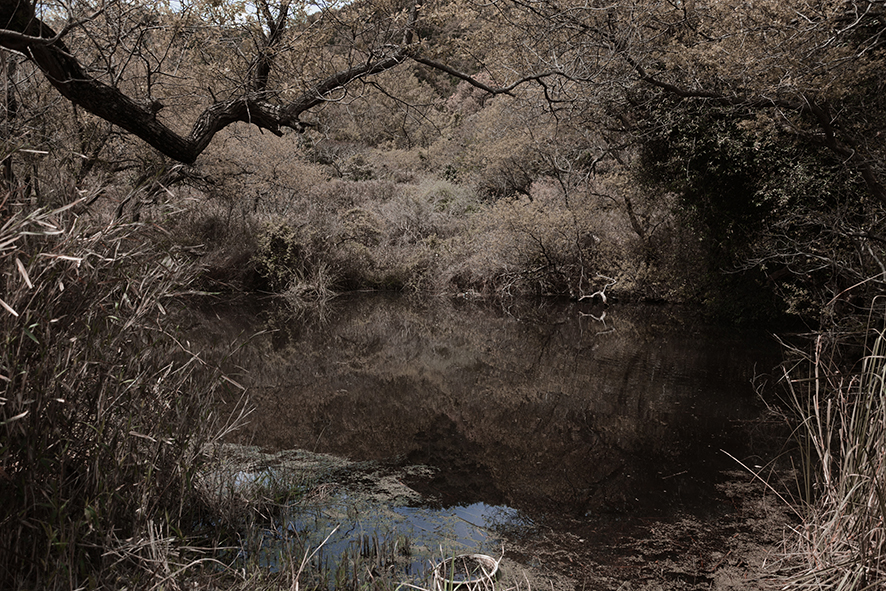
獣たちの糞や死骸を土は蓄え、樹々は力を増し、またその果実を求めてより一層様々な生き物たちが集まってきた。
The soil accumulated the dung and carcasses of animals, the trees grew stronger, and more and more creatures came together in search of the fruits.
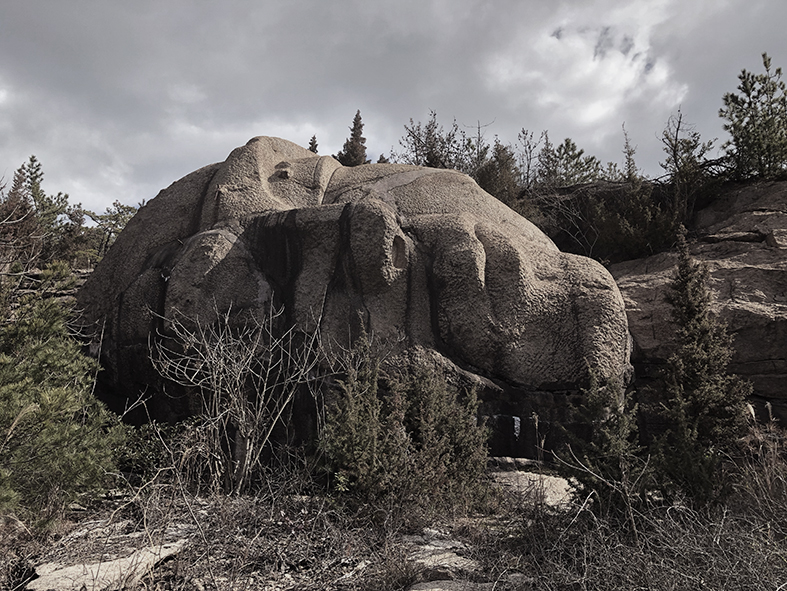
泉は今もなお透き通った緑色で温かな水を保ち、涅槃仏はまだ彫りかけのままで、あたりには木々が繁り山に覆われている。
The springs that the children called 「ONSEN」 still have clear green, warm water, the reclining Buddha is still uncarved,
and the area is surrounded by trees and mountains.
|